The Benefits of Outpatient Withdrawal Management for Substance Use Recovery

Understanding the Role of Outpatient Withdrawal Management in Substance Use Recovery
Outpatient withdrawal management represents a pivotal component of comprehensive addiction treatment, offering a flexible, accessible, and effective alternative to inpatient detoxification. By managing withdrawal symptoms in outpatient settings, individuals can begin their journey toward sobriety while maintaining their daily routines and social connections. This approach emphasizes safety, personalized care, and ongoing support, ultimately empowering patients to transition smoothly into longer-term recovery strategies.
What Is Outpatient Treatment for Substance Abuse?
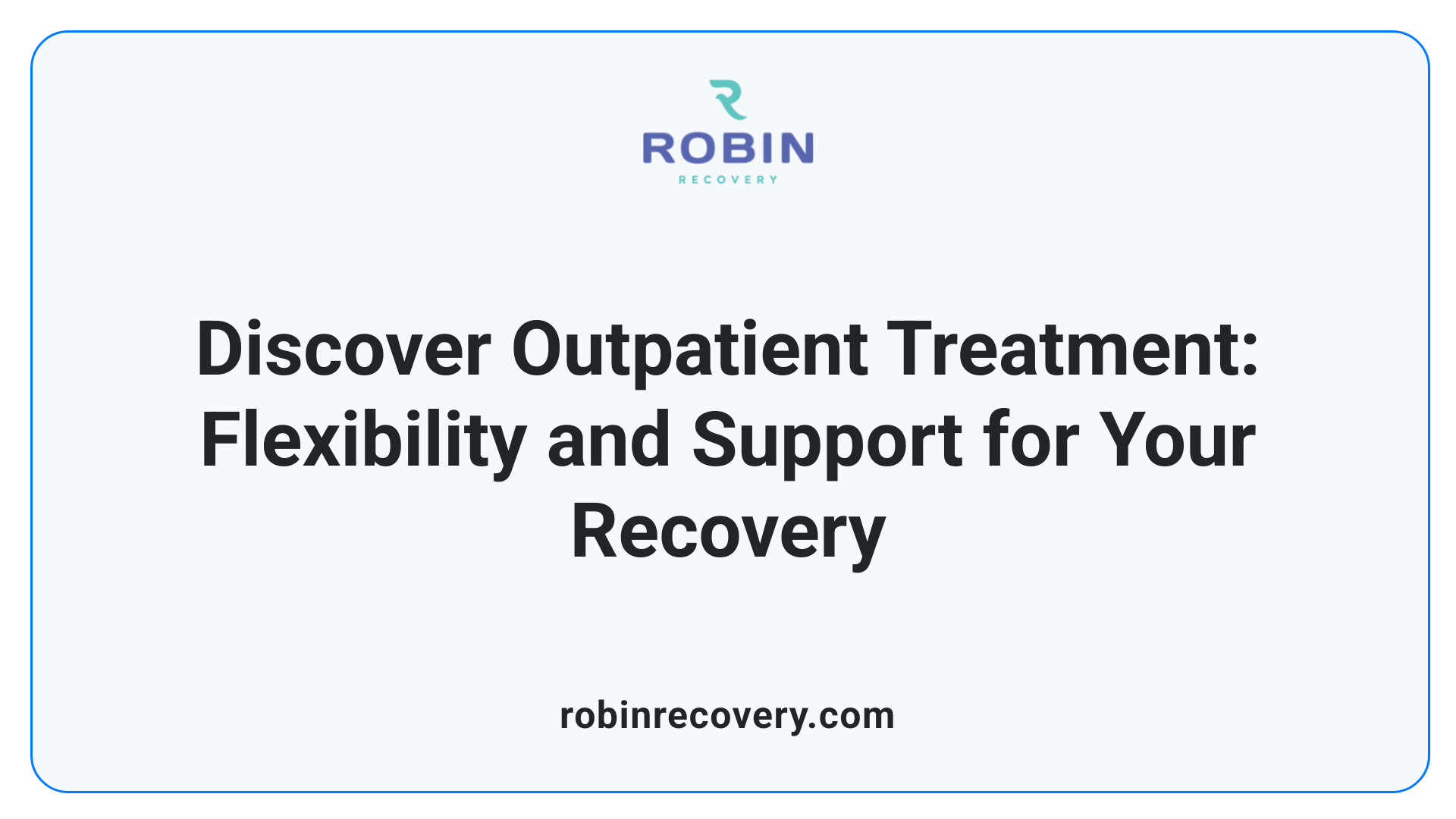
What is outpatient treatment for substance abuse?
Outpatient treatment refers to a type of care where individuals receive therapy, counseling, and medical support without needing to stay overnight at a facility. These programs are designed for people with mild to moderate substance use disorders who are stable enough to continue their daily routines while undergoing treatment.
Substance abuse intensive outpatient programs (IOPs) are specific outpatient services suited for those who do not require full medical detoxification or around-the-clock supervision. They provide structured support and therapy, helping individuals manage their addiction and co-occurring mental health conditions.
Types of outpatient programs including intensive outpatient programs (IOPs) and partial hospitalization programs (PHPs)
Outpatient programs come in different levels of intensity, mainly including:
- Intensive Outpatient Programs (IOPs): These involve several therapy sessions per week, often similar in structure to inpatient care but without overnight stays. They focus on relapse prevention, psychoeducation, and counseling.
- Partial Hospitalization Programs (PHPs): These are more comprehensive, requiring several hours of therapy daily, often resembling inpatient treatments during working hours. They provide close medical monitoring and support while allowing patients to live at home.
Other components typically include individual therapy, group counseling, family therapy, medication-assisted treatment, and holistic approaches such as mindfulness or skills training.
Situations where outpatient treatment is appropriate
Outpatient treatment is suitable under certain conditions:
- When individuals have a stable and supportive home environment.
- For those with mild to moderate substance use disorders.
- If they are physically and emotionally stable enough to participate in ongoing therapy.
- When they prefer or need a less restrictive, flexible schedule, such as working professionals or students.
- For continuing care after inpatient detox or initial treatment, to maintain sobriety and prevent relapse.
In some cases, outpatient care is combined with other services, like family involvement or community support groups, which can enhance long-term recovery outcomes. Overall, outpatient treatment offers a personalized, accessible pathway to sobriety that fits well with many people's lifestyles.
Managing Withdrawal Symptoms Effectively
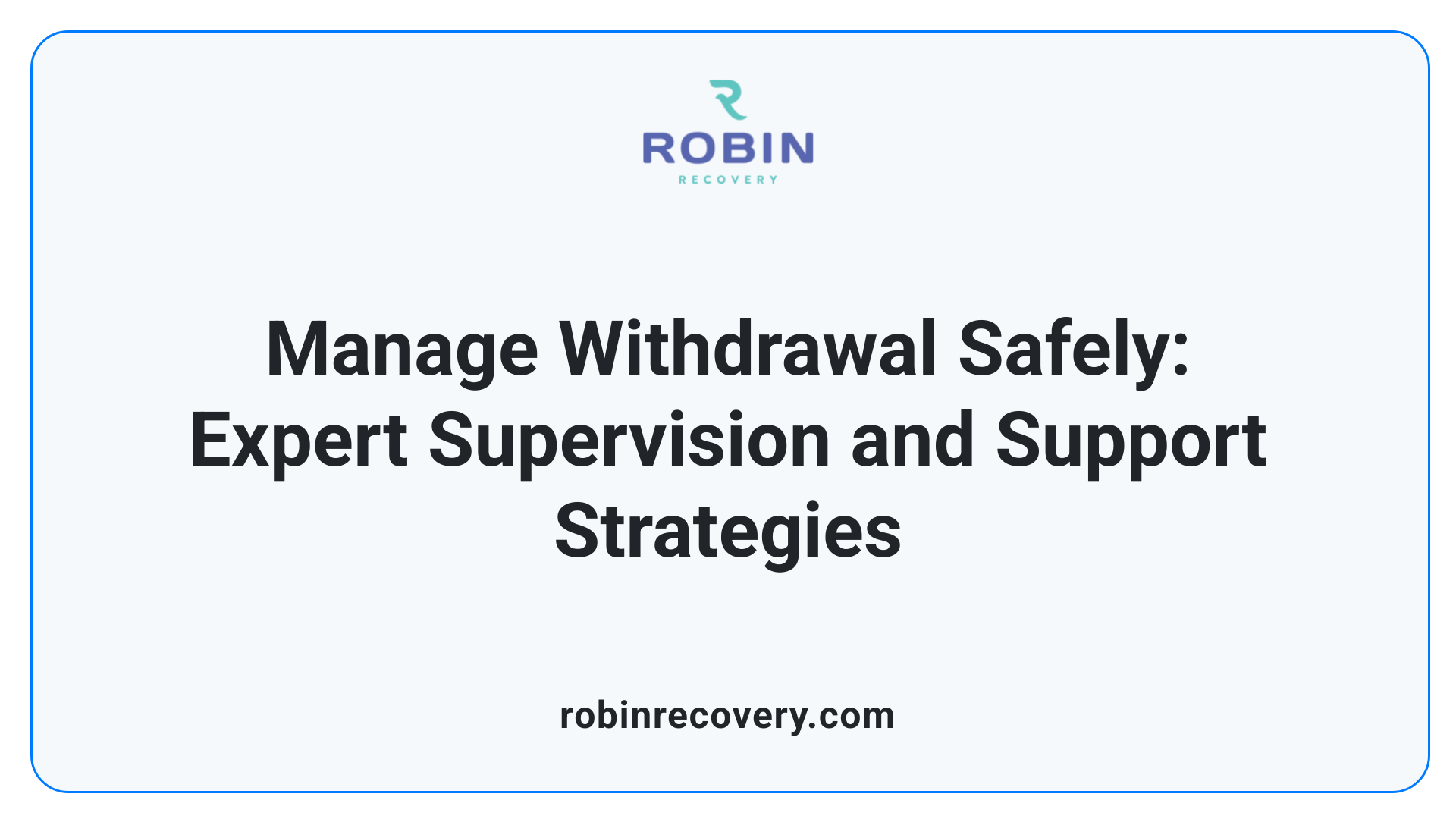
How can withdrawal symptoms be managed effectively?
Managing withdrawal symptoms successfully hinges on expert medical supervision and access to specialized treatment programs. Detoxing from substances such as alcohol and opioids can pose serious health risks, including seizures or life-threatening complications, if not properly monitored.
Professional withdrawal management services, like those provided at BoardPrep Recovery Center, create a safe environment where trained healthcare providers oversee the process. These programs are equipped to promptly address any physical or psychological distress, minimizing potential dangers.
Alongside medical care, there are supportive strategies individuals can adopt to ease discomfort. Staying well-hydrated is essential, as dehydration often accompanies withdrawal. Maintaining a balanced diet helps sustain energy levels and repairs the body. Gentle exercise can reduce anxiety and improve mood, while adequate sleep is crucial for physical and emotional healing.
Relaxation techniques such as deep breathing, meditation, and mindfulness can reduce stress and foster calmness during this challenging period. Distraction methods like journaling, engaging in hobby activities, or body pampering also help divert focus from withdrawal symptoms.
Community resources such as SAMHSA’s National Helpline (1-800-662-HELP) play a vital role. This free, confidential service provides immediate assistance, referrals to local treatment facilities, support groups, and community-based organizations. They can guide individuals toward the appropriate care suited to their needs, further supporting effective withdrawal management.
In summary, combining medical supervision with supportive self-care strategies increases the likelihood of a safe, comfortable, and successful withdrawal process, laying the foundation for ongoing recovery.
Benefits and Advantages of Outpatient Withdrawal Management
What are the benefits of outpatient withdrawal management in the recovery process?
Outpatient withdrawal management presents many advantages that support individuals through their recovery journey. One of the primary benefits is its cost-effectiveness. Compared to inpatient care, outpatient programs generally require fewer resources, making treatment more affordable. This affordability allows more people to access quality care without experiencing significant financial burdens, and the savings can also reduce overall societal costs, such as crime-related expenses.
Another key benefit is the flexibility it offers. Outpatient settings enable individuals to continue their daily routines, including work, family responsibilities, and social activities. This level of flexibility helps individuals stay connected to their support systems and maintain a sense of normalcy, which can be crucial for long-term recovery.
Community support plays an important role in outpatient programs. These programs often connect people with local resources like peer support groups, community organizations, and helplines such as SAMHSA’s National Helpline. This network of support fosters a sense of belonging and shared experience, which can significantly enhance motivation and resilience.
Furthermore, outpatient withdrawal management facilitates a smoother transition into ongoing treatment. It often serves as a step-down from inpatient care, allowing patients to adjust gradually while still receiving necessary medical oversight and psychological therapies. This approach ensures that physical and emotional symptoms are managed effectively, reducing the risk of relapse.
Most importantly, outpatient programs are established to promote long-term sobriety and relapse prevention. They incorporate evidence-based strategies such as cognitive-behavioral therapy, motivational interviewing, family therapy, and medication-assisted treatment. These components help individuals develop coping skills, address mental health issues, repair relationships, and build a supportive environment. In combination, these factors contribute to sustained recovery, increased self-efficacy, and improved overall well-being.
Overall, outpatient withdrawal management is a versatile, accessible, and effective option for many seeking to recover from substance use disorders. It not only supports immediate recovery needs but also lays a solid foundation for lasting sobriety and healthier living.
Types of Outpatient Withdrawal Programs, Including Ambulatory Detox
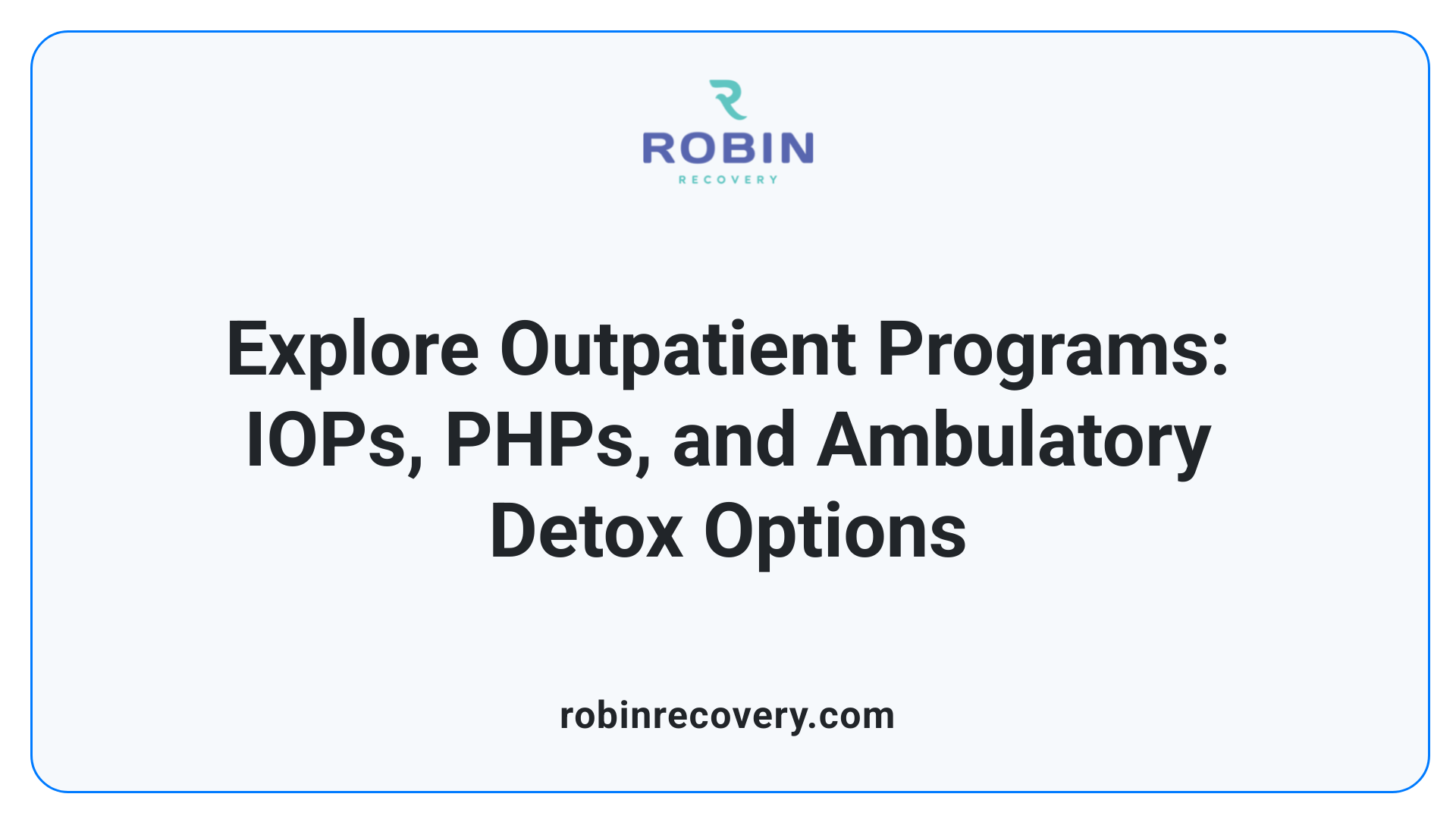
Outpatient withdrawal programs offer flexible and accessible options for managing substance dependence without requiring full-time residence in a treatment facility. These programs are tailored to the severity of the dependence and the patient's ability to manage withdrawal symptoms at home.
One of the primary outpatient models is ambulatory detoxification, which can be categorized into Level I-D and Level II-D programs. Level I-D involves supervised medication management in outpatient settings like clinics or physician offices, suitable for individuals with mild to moderate withdrawal symptoms. Level II-D provides more intensive supervision, often including daily visits and monitoring to ensure safety during detox.
In addition to ambulatory detox, other outpatient options include Intensive Outpatient Programs (IOPs) and Partial Hospitalization Programs (PHPs). IOPs typically involve several hours of treatment sessions per day, focusing on therapy, counseling, and relapse prevention. PHPs usually resemble inpatient care but allow patients to return home in the evenings, providing a higher level of support for those with moderate withdrawal symptoms.
Medications such as Disulfiram, Naltrexone, and Buprenorphine play a significant role in outpatient detox efforts. Disulfiram discourages alcohol consumption by causing unpleasant effects when alcohol is ingested. Naltrexone reduces cravings for alcohol and opioids, while Buprenorphine is used for opioid detox, alleviating withdrawal symptoms and preventing relapse. These medications are administered under medical supervision to ensure safety and effectiveness.
Appropriate candidate profiles for outpatient withdrawal programs generally include individuals with mild to moderate withdrawal symptoms, stable living environments, and strong support systems. Patients must be motivated and capable of adhering to prescribed treatment regimens, including medication schedules and therapy sessions. Those with severe withdrawal symptoms, unstable mental health, or lack of support are usually directed toward inpatient detox facilities.
The duration of outpatient detox varies but typically lasts between three to fourteen days, depending on the specific program and individual needs. The structure involves regular medical evaluations, psychological support, medication management, and aftercare planning. This approach allows patients to stabilize physically and emotionally while maintaining their daily routines, promoting better adherence to ongoing treatment and long-term recovery.
Comparison Between Outpatient and Inpatient Withdrawal Management
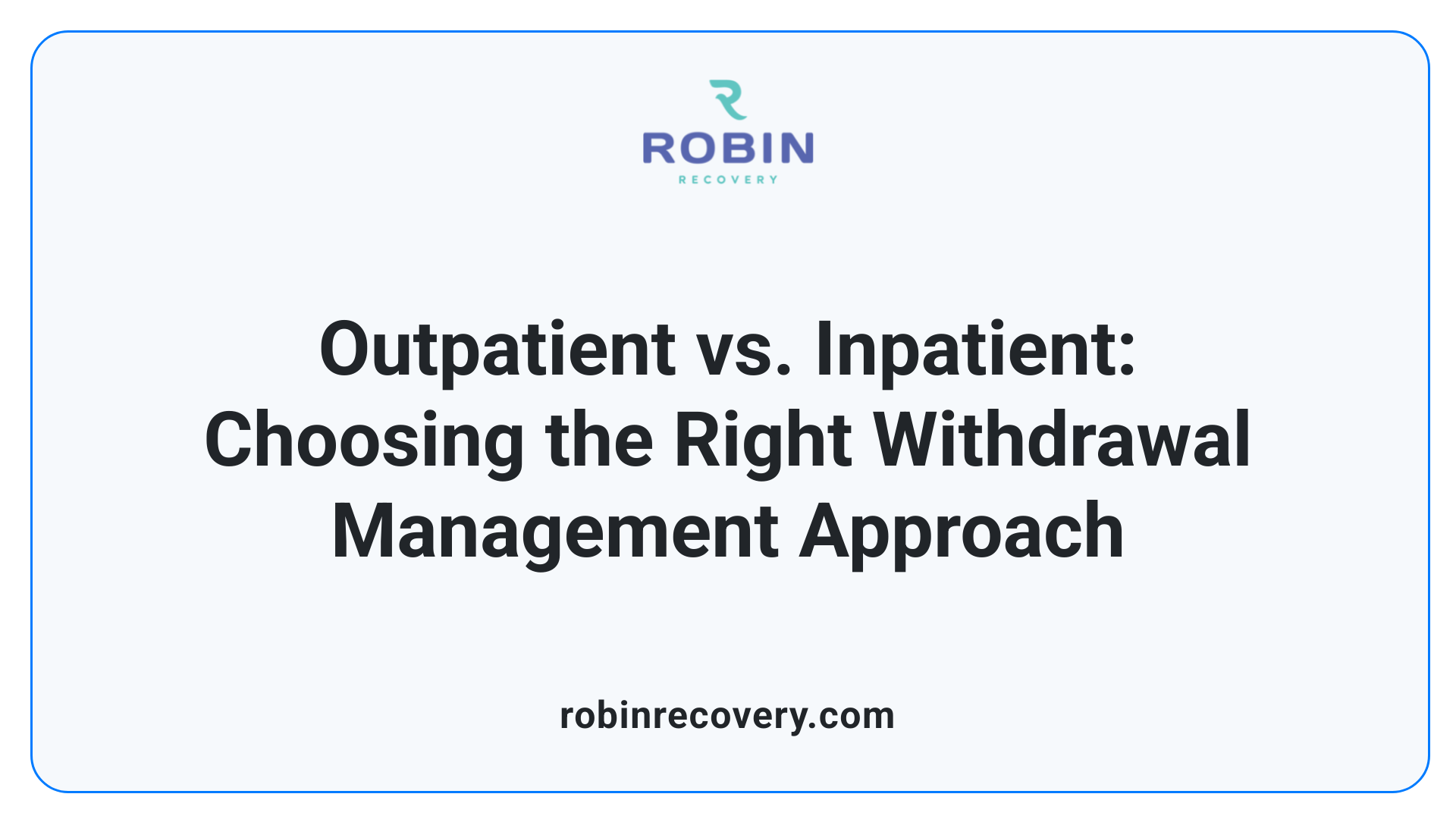
How does outpatient withdrawal management compare to inpatient treatment?
Outpatient withdrawal management offers a flexible and often more affordable alternative to inpatient care. It enables individuals to continue their daily routines, such as work or family responsibilities, by attending scheduled treatment and therapy sessions at healthcare facilities while living at home. This approach is particularly suitable for those with mild to moderate addictions, stable living environments, and strong support systems.
In contrast, inpatient treatment involves residing full-time at a detox or rehabilitation facility for periods typically lasting from one month to several months. It provides a highly structured environment with constant medical supervision and support, making it ideal for severe substance use disorders or complicated withdrawal cases. Inpatient programs facilitate intensive peer interaction, a distraction-free setting, and focused care, which are essential for individuals experiencing severe withdrawal symptoms or with co-occurring mental health conditions.
Differences in treatment structure and supervision
Treatment Aspect Outpatient Management Inpatient Treatment Additional Details Supervision level Periodic medical oversight Continuous medical supervision 24/7 Ensures safety during withdrawal Environment At home or community setting Residential, designated facility Controlled environment with fewer external triggers Treatment duration Varies from weeks to over a year Usually 30-90 days, or longer Tailored to individual needs Focus of care Physical stabilization, therapy, medication management Full-time care, intensive therapy Supports complex cases
Suitability based on severity of addiction and medical needs
Outpatient withdrawal management is best suited for individuals with less severe addiction profiles, stable medical conditions, and access to reliable social support. It is also appropriate for those who have completed inpatient detox and require ongoing care to maintain sobriety.
Inpatient care is generally recommended for people with severe dependence, significant health risks, or those who have failed previous outpatient treatments. Severe withdrawal symptoms, such as seizures or delirium tremens, necessitate continuous medical oversight that only inpatient programs can provide.
Advantages of outpatient treatment (cost, flexibility, community integration)
Outpatient programs are generally less expensive than inpatient care because they do not involve accommodation or 24/7 medical staffing costs. They are more accessible for many individuals, especially those with limited financial resources or insurance coverage.
Flexibility is a major benefit, allowing patients to attend therapy sessions during the day while still fulfilling work and family responsibilities. This setup helps maintain social connections and reduces feelings of isolation, which can be critical for long-term recovery.
Moreover, outpatient programs facilitate community integration by enabling individuals to practice coping skills and relapse prevention strategies in real-life scenarios, increasing their confidence and self-efficacy.
Situations where inpatient care is preferable
While outpatient management suits many, inpatient care remains essential in certain situations:
- When there is a risk of severe withdrawal symptoms, including seizures or delirium tremens.
- For individuals with complex co-occurring mental health disorders that require constant supervision.
- When a person lacks a safe and stable home environment.
- For those who have a history of relapse despite outpatient efforts.
In such cases, the comprehensive support and 24/7 medical oversight provided by inpatient programs significantly enhance safety and the likelihood of successful detoxification and recovery.
Aspect Outpatient Management Inpatient Treatment Suitability Considerations Cost Lower overall Higher Limited financial resources, insurance coverage Flexibility High; compatible with daily routines Low; full-time commitment Life responsibilities, employment Support Family and community-based Structured support within the facility Need for supervision vs. autonomy Severity of addiction Mild to moderate Severe or complicated cases Medical stability, risk factors
By understanding these distinctions, individuals and healthcare providers can make informed decisions about the most suitable withdrawal management approach, optimizing safety and long-term recovery success.
Supporting Long-Term Recovery and Relapse Prevention
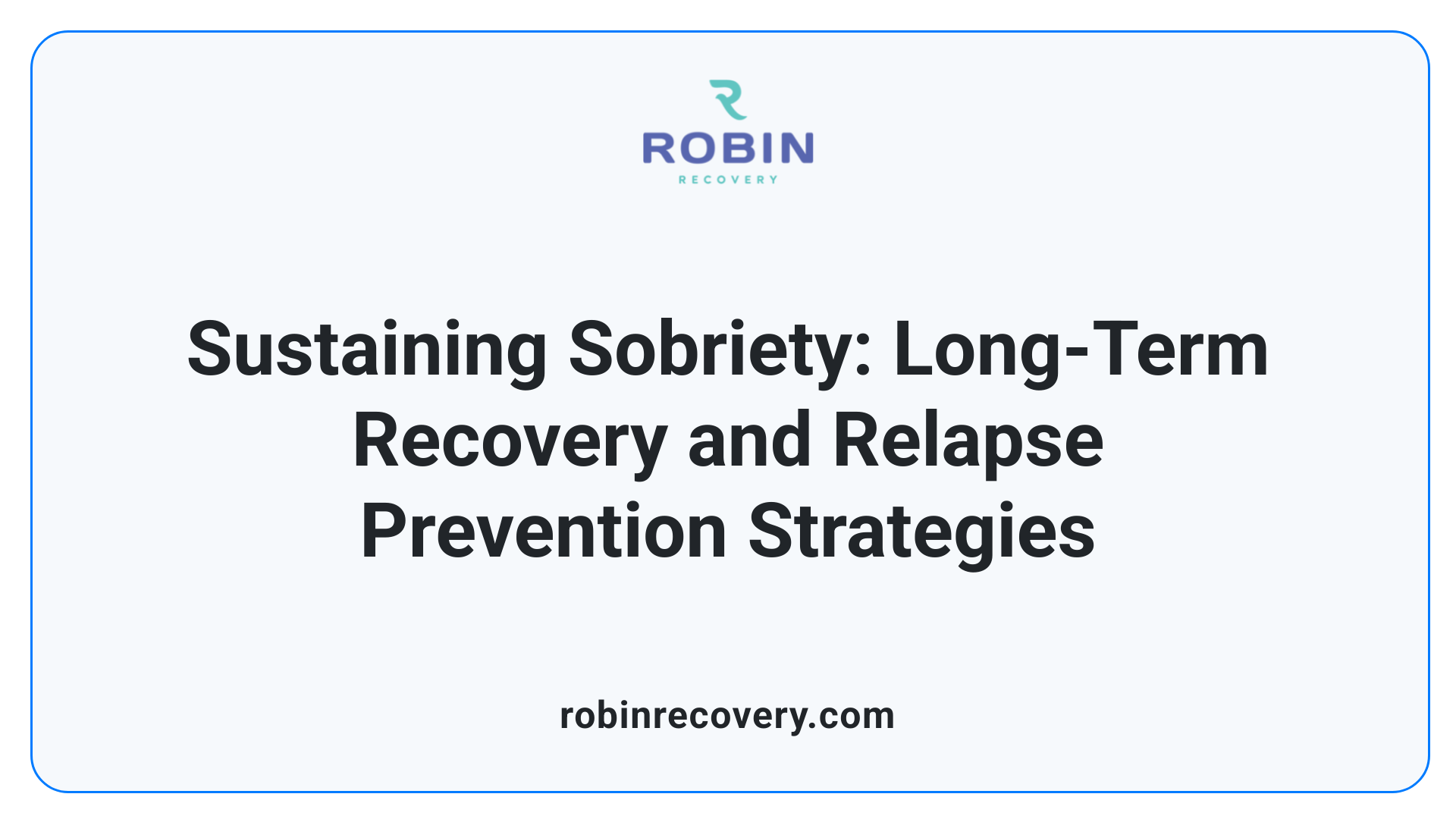
How does outpatient withdrawal management support ongoing recovery and relapse prevention?
Outpatient withdrawal management plays a crucial role in laying the foundation for long-term sobriety by maintaining a supportive environment for individuals. It encourages active participation in therapy, peer support groups, and community activities, which helps reduce feelings of isolation often associated with recovery.
Participating in outpatient treatment allows individuals to share experiences and gain insights from others facing similar challenges. This connection fosters a sense of community, accountability, and motivation, all of which are critical for relapse prevention.
Moreover, outpatient programs include relapse prevention strategies such as cognitive-behavioral therapy, which helps individuals develop coping skills to handle triggers and stressors. Personal resilience is strengthened through tailored treatment plans, ongoing counseling, and involvement in supportive networks.
Continued care and follow-up after outpatient detox
Sustained recovery requires continuous care beyond initial detoxification. Follow-up services like regular therapy sessions, support groups, and medical check-ups help monitor progress and prevent relapse.
Many programs emphasize developing personalized long-term treatment plans, incorporating ongoing psychological support, medication management, and life skills training. This ongoing engagement ensures that individuals can address emerging challenges and adapt their recovery strategies.
Role of therapy, peer support, and community involvement
Therapeutic interventions such as individual and group counseling foster emotional resilience and behavioral change. Peer support groups like Alcoholics Anonymous (AA) and Narcotics Anonymous (NA) offer a safe space to share experiences, find encouragement, and build understanding among peers.
Community involvement in recovery activities reinforces a sense of belonging and purpose, which can be vital in reducing the risk of relapse. Connecting with community resources also provides additional support channels that promote long-term stability.
Building coping skills and resilience
Effective relapse prevention hinges on developing robust coping mechanisms. Outpatient programs focus on education about managing cravings, handling stress, and avoiding high-risk situations.
Resilience-building exercises, mindfulness practices, acceptance and commitment therapy, and motivational interviewing are integrated into treatment to empower individuals to face life’s challenges confidently.
Engagement in support groups like AA and NA
Participation in groups such as AA and NA is strongly associated with improved long-term outcomes. These groups provide ongoing encouragement, shared accountability, and a sense of community that sustains sobriety.
Many individuals find that regular attendance and active involvement in these groups help reinforce their commitment to recovery and provide essential social support.
Long-term treatment planning
Recovery is a lifelong process, often involving continued therapy, periodic evaluations, and adaptation of treatment strategies. Outpatient programs offer flexible, personalized care that can extend from months to years.
Effective planning includes education on relapse warning signs, ongoing medication-assisted treatment where appropriate, and engagement with support networks. This comprehensive approach helps individuals integrate recovery into all aspects of daily life, increasing the chances of maintaining sobriety.
Conclusion: Embracing Outpatient Withdrawal Management as a Key to Recovery
What are the benefits of outpatient withdrawal management in the recovery process?
Outpatient withdrawal management offers a flexible and cost-effective way for individuals to begin their recovery journey from substance use disorders. Unlike inpatient programs, outpatient care allows individuals to continue their daily routines, including working, attending school, and maintaining social relationships, while receiving essential treatment.
This approach provides access to medical supervision and medications like Naltrexone or Buprenorphine, which help ease withdrawal symptoms and reduce cravings. It also incorporates psychological therapies such as Cognitive Behavioral Therapy (CBT), Motivational Interviewing, and family counseling to address emotional and mental health issues associated with addiction.
One of the key advantages is that outpatient programs can integrate community support resources, including support groups like Alcoholics Anonymous (AA) and Narcotics Anonymous (NA), which are vital for long-term sobriety.
Research shows that for individuals with mild-to-moderate symptoms and a low risk of severe complications, outpatient detoxification methods are as effective as inpatient options. They can lead to significant improvements in recovery outcomes, reducing the chances of relapse.
Outpatient withdrawal management not only empowers patients with the tools for a successful recovery but also fosters social support systems, which are crucial in maintaining sobriety over the long term.
Why are personalized treatment plans important?
No two recovery journeys are identical. Personalized treatment plans are tailored to each individual’s specific needs, considering factors like the substance used, severity of dependence, mental health status, and personal circumstances. Such customization enhances treatment effectiveness by addressing unique challenges and strengths.
In outpatient settings, care providers can adjust therapy intensity, medication use, and support services over time, providing ongoing assessment and modification. This adaptability helps ensure that patients receive the right level of care at each stage of their recovery.
How does outpatient care integrate with broader addiction treatment strategies?
Outpatient withdrawal management is a crucial part of a comprehensive addiction treatment continuum. It often serves as the initial phase, preparing individuals physically and emotionally for more intensive therapy or support group participation.
Following detox, patients can transition smoothly into outpatient therapy, including individual, group, and family counseling, which address underlying issues contributing to substance use. Medication-assisted treatment (MAT) supports long-term management by reducing cravings and preventing relapse.
This integrated approach ensures that physical dependence, mental health, social factors, and behavioral aspects are all managed in a coordinated fashion, increasing the likelihood of sustained recovery.
Moreover, ongoing community resources and aftercare programs facilitate continuous support, helping individuals navigate challenges such as triggers and stressors.
Encouragement for individuals seeking treatment
If you or someone you care about is struggling with substance use, outpatient withdrawal management can be an effective starting point. It offers privacy, flexibility, and access to professional medical and psychological support.
Remember, recovery is a journey that benefits from personalized care and community involvement. Reaching out to resources like SAMHSA’s National Helpline can connect you with local treatment facilities, support groups, and community organizations dedicated to helping you succeed.
Embrace the opportunity for a new beginning. With the right support and treatment plan, long-term sobriety and improved well-being are within reach.
Moving Forward with a Holistic Approach to Recovery
Outpatient withdrawal management stands as a pillar of modern addiction treatment, offering an effective, adaptable, and patient-centered pathway towards sobriety. By combining medical oversight, psychological support, community involvement, and personalized care, outpatient programs enable individuals to reclaim control over their recovery journey while minimizing disruption to their lives. As the landscape of substance use treatment continues to evolve, embracing outpatient withdrawal management can foster sustained recovery, reduce relapse rates, and improve overall quality of life for those battling addiction. Ultimately, tailored outpatient care, integrated with long-term support strategies, paves the way for enduring sobriety and a healthier future.
References
- National Helpline for Mental Health, Drug, Alcohol Issues
- Benefits of Withdrawal Management for Addiction in ...
- Benefits of Outpatient Treatment | Addiction Treatment | FL
- Chapter 5—Specialized Substance Abuse Treatment ...
- Inpatient Vs. Outpatient Rehab
- The Top 10 Benefits of Outpatient Treatment for Alcohol ...
- What Happens During Alcohol & Substance Abuse Detox?
- Outpatient Addiction Treatment in Illinois
- Benefits of Ambulatory Detox: Recovery with Convenience ...
